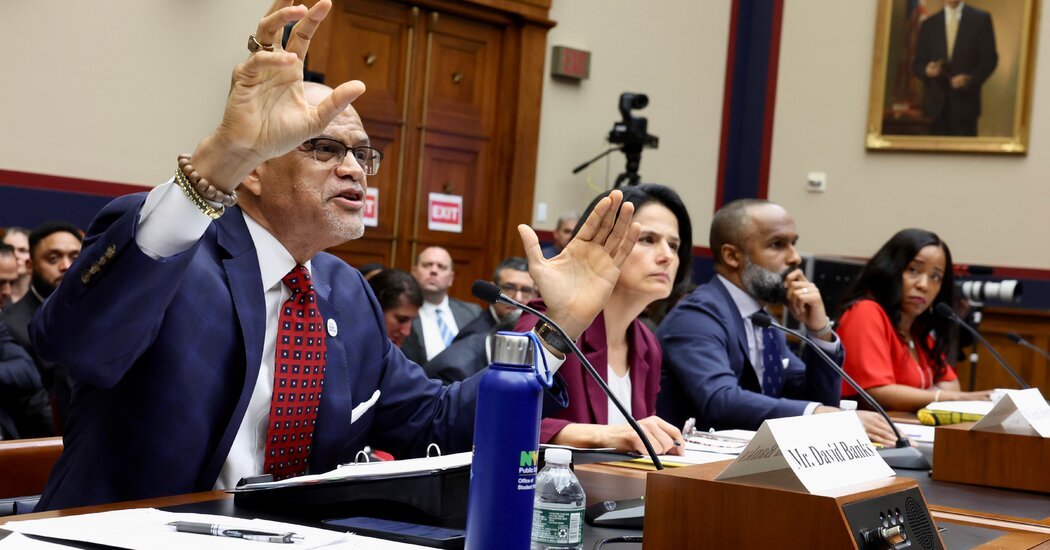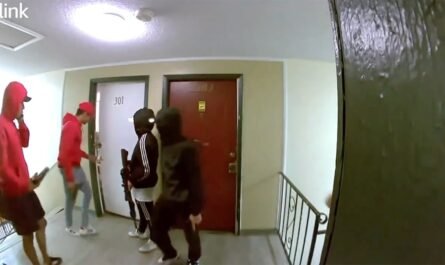A Republican-led House committee turned its attention to three of the most politically liberal school districts in the country on Wednesday, accusing them of tolerating antisemitism, but the district leaders pushed back forcefully, defending their schools.
The hearing was the third by House Republicans to expose what they see as a pro-Palestinian agenda gripping schools and college campuses since the start of the Israel-Hamas war.
During the contentious two-hour session, Republicans accused the district leaders — from New York City, Berkeley, Calif., and Montgomery County, Md. — of “turning a blind eye” to antisemitism.
Enikia Ford Morthel, the superintendent of Berkeley schools, acknowledged some incidents in her schools, but pointedly stated that “antisemitism is not pervasive in Berkeley Unified School District.”
And David C. Banks, the New York City schools chancellor, said the repeatedly hostile questions from the panel suggested it was trying to elicit “gotcha moments” rather than solve the problem of antisemitism.
“We cannot simply discipline our way out of this problem,” he said. “The true antidote to ignorance and bias is to teach.”
The hearing came about five months after a hearing on antisemitism in which the presidents of Harvard University and the University of Pennsylvania gave lawyerly statements, prompting an intense backlash that helped lead to their resignations.
But on Wednesday, Republicans did not appear to elicit similarly damaging moments.
Nor did the school leaders’ answers appear to prompt widespread anger back in their communities, as happened when Nemat Shafik, the president of Columbia, testified before Congress last month. Her promise to crack down on protesters seemed to mollify Republicans, at least temporarily, but deepened discontent on campus.
A confluence of factors led to the muted outcome on Wednesday. The hearing was held by a subcommittee with an inexperienced chair, featuring only a cameo by Representative Elise Stefanik of New York, the Republican who led the sharpest questioning of the university presidents.
The school leaders also seemed prepared for questions that had tripped up the Harvard and Penn presidents.
When Representative Aaron Bean of Florida, the first-term Republican who led the hearing, opened with a series of rapid-fire questions — Does Israel have the right to exist as a Jewish state? Was the Oct. 7 Hamas attack on Israel an act of terrorism? — the school leaders gave brief, affirmative answers.
He then moved on, saying he had “to boogie” to get through the hearing.
Throughout, the district leaders were quick to condemn antisemitism and said that they had addressed antisemitic incidents in their schools through disciplinary measures and new teaching guides to combat hate.
Mr. Banks said that New York had removed or disciplined, or was in the process of disciplining, at least a dozen staff members and school leaders, including removing a principal in the middle of the school year.
The district has also suspended at least 30 students, has involved the police when hate crimes were committed, and has retrained all 1,600 principals on the disciplinary code, he said.
Republicans accused him of not taking strong enough action.
In one of the more heated exchanges, Representative Brandon Williams, Republican of New York, grilled Mr. Banks about an incident last fall at Hillcrest High School in Queens, where, officials said, students led a raucous demonstration against a pro-Israel teacher.
The Education Department removed Hillcrest’s principal in December. Under questioning from Mr. Williams, Mr. Banks acknowledged that the principal was still on the city payroll.
“How can Jewish students feel safe in New York City public schools when you can’t even manage to terminate the principal of ‘Open Season on Jews High School,’” Mr. Williams said.
Mr. Banks, who graduated from Hillcrest in the 1970s, responded: “It’s not ‘Open Season on Jews High School.’ It’s called Hillcrest High School. That’s the name of the school, and at that school, we considered his leadership not strong enough to be the leader in that school.”
Questioned again about why the Hillcrest principal had not been fired, Mr. Banks said that every employee in the school system has due process rights. Ms. Stefanik later forced Mr. Banks to acknowledge that the principal was still employed, in Mr. Banks’s words, on “one of the teams under one of our deputy chancellors.”
Ms. Stefanik also asked Mr. Banks about a New York City teacher who posted approvingly about Hamas on social media. Mr. Banks called the teacher’s posting “absolutely disgusting,” but refused to say what disciplinary action had been taken, if any.
Ms. Stefanik complained that Mr. Banks and other school leaders were paying “lip service” to the issue of antisemitism, and that there was “a lack of enforcement and a lack of accountability.”
Mr. Banks rejected that accusation. Overall, he said, the New York City school system has recorded more than 280 “incidents” since Oct. 7. About 40 percent have been antisemitic, he said, and another 30 percent were Islamophobic. He said that while the district “can’t prevent every incident from ever happening,” school leaders were doing their best.
He pointed to an incident at a Brooklyn grade school, where a map of North Africa and the Middle East did not include Israel, labeling it “Palestine.” Mr. Banks said that “to me, that’s antisemitic.” But he also pushed back on calls to fire the teacher, saying she acknowledged that she “made a mistake.”
The teacher, Rita Lahoud, who identified herself as a Palestinian American, said in an email on Tuesday that she “felt abandoned and unprotected” by the city’s Education Department after news of the classroom map drew backlash on social media.
Ms. Ford Morthel, the superintendent in Berkeley, said Jewish students in her district had shared painful stories about antisemitism in their schools. But she refused to say whether any teachers had been fired in response to accusations of antisemitism.
Under questioning by Representative Kevin Kiley, Republican of California, Ms. Ford Morthel acknowledged that a group known as Liberated Ethnic Studies was a “thought partner” of the district. That group has put forth sample teaching materials that portray Israel as a settler-colonial entity and are strongly critical of the country.
Karla Silvestre, the school board president in Montgomery County, outside Washington, said the board was committed to fighting antisemitism, hatred and racism, but “I can tell you we haven’t gotten it right every time.”
Still, she said, the board tries to improve its responses, and starting this summer, Montgomery County will have “mandatory hate-based training” for all staff.
Some critics of the education system who attended the hearing said they were disappointed.
“I thought that the questions were not sharp,” said Lori Lowenthal Marcus, legal director of the Deborah Project, a group that has sued several California school districts, including Berkeley, for what it considers antisemitic bias in curriculum materials about Israel. “I thought that the people testifying were able to slide away.”
The top Democrat on the panel, Representative Suzanne Bonamici of Oregon, accused Republicans of hypocrisy, pointing out that President Donald J. Trump spoke of “very fine people on both sides” after white supremacists marched in Charlottesville, Va., in 2017, chanting “Jews will not replace us.”
“If my colleagues cared about antisemitism, they would denounce and condemn these comments from the leader of their party,” Ms. Bonamici said. “Does anyone have the courage to stand up against that?”
After a pause, she said, “Let the record show that no one spoke up.”
Alan Blinder, Jacey Fortin, Heather Knight, Sarah Mervosh and Campbell Robertson contributed reporting.


